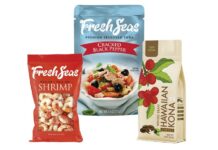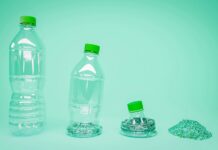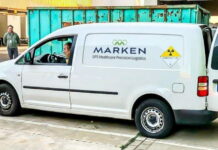To make product packaging more consumer, brand, and ecologically friendly, the packaging industry has embraced smart and sustainable solutions. The internet of packaging, active packaging, as well as nanotechnology are three important packaging industry developments that enable smart packaging. However, since the COVID-19 pandemic has confined people at home, online shopping packaging poses a substantial waste production concern. As a result, disposable, reusable, and edible packaging innovations are accelerated by startups and scaleups. Simultaneously, the use of 3D printing and robotic packing streamlines packaging processes and lowers prices for consumers.
Internet of Packaging
Traditional packaging is being disrupted by the Internet of Packaging, which allows customers to better communicate with companies. QR codes, smart labels, RFID, as well as near-field communication (NFC) chips are all used in smart packaging. These cutting-edge technologies integrate safety, authorization, and connectivity into the product packaging, turning it into a data carrier and digital tool. Companies can use augmented reality packaging to better engage customers by presenting them with a variety of product information, coupon codes, and video instructions. In addition, IoT devices enable firms to include diagnostic and indicator functionality in their packaging, giving consumers real-time product information.
Langgeng Sukses Abadi Technology | Anti-Counterfeit Solutions
QTRUST, an anti-counterfeit system, is offered by Indonesian firm Langgeng Sukses Abadi Technology. Brand owners and buyers may check product authenticity using QR codes and cloud computing, thanks to the startup’s integration of the two technologies. Each product is given a unique security code that lets brand owners and retailers follow it along the supply chain. This is accomplished using the company’s web-based interface and applications. QTRUST allows businesses to communicate with customers, tell the right brand story, and conduct customer surveys. Users may check product details, shop location, transaction history, and earn reward points using the startup’s mobile app.
RightMash Technologies | Food Consumption Tracking
RightMash Technologies, based in the United Kingdom, is developing an IoT-based real-time food intake tracking technology. The food item is put on an NFC-enabled sensor, which detects slight weight variations in the food product or box. The startup’s technology then analyses consumption trends and inventory using big data. The software automatically sends out an alert in the instance of low supply, reorder, or expired products. Food makers can boost their profits by eliminating losses caused by rotting, spoilage, mistreatment, or human error.
Biodegradable Packaging
Since the break of the 20th century, plastic has been an all-round, acceptable used packaging material. Its slow disintegration rate, on the other hand, causes widespread environmental issues. Consumers are demanding eco-friendly choices as they become progressively aware of the harmful repercussions of single-use plastic packaging. Biodegradable packaging and films are gaining popularity as viable alternatives to conventional plastic packaging. Starch, polyhydroxybutyrate (PHB), polyhydroxyalkanoates (PHA), cellulose, PLA, and other biopolymers are just a few examples. Plastic is also being replaced by plant-based packaging made from coconut, sugarcane, hemp, and corn starch. These improvements are cost-effective for firms to implement and diminish the packaging industry’s environmental impact.
OCEANIUM | Compostable Seaweed Packaging
OCEANIUM is a start-up headquartered in the United Kingdom that creates items using sustainably farmed seaweed. The company obtains seaweed and then uses refinery technology and marine biology to get the most value from it. It makes OCEAN WARE, a bio-packing material that is all-natural and compostable at home and replaces typical use-and-throw packaging. The company’s first packaging was designed to be recycled for soil health or anaerobic digestion for energy generation.
LAM’ON | Corn-based Foil Packaging
LAM’ON, a Bulgarian business, makes biodegradable and compostable lamination films and foil packaging. PACK’ON, a packaging foil made of polylactic acid (PLA) generated from corn, is produced by the company. The solution is ideal for food packaging due to the use of silver nanoparticles as antibacterial additions in the foil and its oxygen barrier qualities. Organic resources such as water, carbon dioxide, and composites erode the film and foil. The product’s polymer threads are biaxially aligned, making it more robust and less susceptible to tearing. PACK’ON also shows no oil or other element migration, making it suitable for food as well as cosmetic packaging.
Digital Printing
Printing on packaging presents a number of issues, including precision, low colour quality, and high labour expenses. This allows for digital printing to be used to reinvent the process, making it one of the top packaging industry developments. It does not require different plates for distinct prints, unlike standard offset or flexo printing procedures. In digital printing, all of the information is published in a single pass, which saves time. Modern digital printing has a low environmental impact since it removes the need for prepress procedures and supplementary labelling, resulting in less waste and inventory. Digital printing allows firms to create customised packaging for distinct subgroups of consumers with fewer cycle times and more flexibility. Another printing process is direct thermal printing, which uses thermal imaging to print labels and flexible packaging without the need for ink.
Flexible Pack | Digital Printing In Flexible Packaging
Flexible Pack has a lot to offer. Flexible packaging can benefit from digital printing. Flexible Pack is a startup established in the United States that specialises in digital printing for flexible packaging. It prints on flexible packages, shrink sleeves, pouches, and labels with an HP Indigo digital press. Gravure-matching quality, a wide colour scale, enhanced efficiency, and elevated automated finishing are all features of the startup’s technology. Printing changeable data, such as barcodes or QR codes, is also made easier with this method. Printing on heat-sensitive materials is also supported by the startup.
Copy4LessNY | Package & Label Printing Services
Copy4LessNY, a firm established in the United States, offers printing services for packaging and labels. It provides fast turnaround times on digital printing for corrugated cardboard, cartons, and films. In addition, the company provides custom packaging labels for products.
Packaging Automation
Productivity, precision, as well as quality control are three main issues in packaging. Automation of packaging processes such as depanning, filling, packing, and palletizing is a popular trend in the packaging business. Packaging automation with robotic arms as well as grippers removes human mistakes while also ensuring the safe handling of sensitive products. Finally, AI-powered vision systems that snap photographs of finished goods to analyse package quality are being developed by entrepreneurs. To improve overall productivity, these vision-assisted robots automate operations like item sorting, quality assurance, and inspection.
Wootzano | Dexterous Robotic Systems In Food & Vegetable Packaging
Wootzano is a firm based in the United Kingdom that develops robotic systems for handling exceedingly delicate goods. Trimming, selecting, and packaging fresh produce such as tomatoes and grapes are all possible using the startup’s robotic technology. To complete tasks and adapt to changing circumstances, the robots use machine learning techniques. LiDAR is also used for weight estimation and inspection automation. The robot’s electronic skin-covered hand has excellent sensory receptors, enabling it to manage tender produce without squeezing it. It also forecasts product shelf life, allowing firms to cut down on food waste.
CoRobotics | Co-bots for Packaging and Palletization
A startup in Poland CoRobotics designs and manufactures packing robots for a variety of repetitive packaging operations. Their SmartPalletizer is a robotic system that streamlines the whole palletizing and depalletizing procedure and is simple to programme. A user-friendly application with palletizing parameters is used to configure the system. Layers can also be duplicated, or alternative palletizing methods can be set up. On the touch screen, the user must also enter the size and quantity of pallets and the robot’s position, including the use of spacers. In addition, the SmartPalletizer adjusts and executes one or two pallet palletization or depalletization processes. Sensors identify the presence of the pallet and cardboard at the end of the line, among other properties of the robot.
Active Packaging
One-third of all food produced for human consumption is wasted globally, as per the Food and Agriculture Organization (FAO). Food waste is a significant issue that needs to be addressed, as businesses often lose a lot of money as a result of it. Active packaging extends the shelf life of a product and is becoming a popular packaging technology in the beverage, food, and pharmaceutical industries. Modified atmospheric packing, for example, keeps food fresh by using oxygen or ethylene absorbers and humidity controllers. Antimicrobial compounds are released by active packaging to limit bacterial contamination in the product.
SoFresh | Active Packaging Films & Containers
SoFresh is a food-saving packaging startup established in the United States. The company is working on ways to infuse food-grade organic ingredients into film or containers, resulting in a controlled release of the active vapour in the food item. Mold spores collect the vapour, slowing their metabolism and making it difficult for them to live. Bread and bakery package, over-wrap sheets, lid stock materials, plus barrier laminations are among SoFresh’s packaging offerings. Its active packaging solution allows businesses to increase food travel time, storage stability, and consumption time, reducing spoilage and waste.
Impactful Health R&D | Compostable Active Packaging for Fish
Impactful Health R&D, a Canadian firm, is working on a packaging solution to extend the shelf life of raw fish. The company provides an active film-based technology using antibacterial components sourced from natural sources. The film is biodegradable and meets the FDA criterion for oxygen transmission rate. It’s also helpful in the vacuum packaging industry because it maintains the fish’s texture. The startup’s innovation has the potential to prolong the shelf life of fish by a significant length of time. This reduces losses for fish sellers, re-sellers, and the aquaculture business.
Custom Packaging
The aesthetics of a product are quite important in attracting customers. As a result, as a marketing device for enterprises, packaging is just as important as the product itself. The difficulty for brands is keeping their packaging appealing in order to increase sales. Making the unpacking experience more customised and distinctive is essential for making a lasting impression on customers and encouraging them to return to the business. Coca-Cola’s “Share a Coke” campaign, for example, had initials printed on the box to add a personal touch.
PACKMOJO | 3D Models for Custom Packaging
PACKMOJO is a Chinese firm that enables businesses to create their own unique packaging without having to hire a designer using its online platform. In addition, the platform allows the brand to see its layout in 3D and receive immediate price quotes. By using packaging made up of 50% post-consumer trash, the company encourages sustainability. Moreover, they print with environmentally friendly inks such as soy ink and seal the ink with a water-based varnish rather than lamination.
HUIDE PACKAGING | Kraft Paper Bags & Boxes
HUIDE PACKAGING happens to be a Chinese startup known to creating customised paper packaging solutions. In-house packaging engineers at the startup specialise in designing a structure that safeguards the object from damage. In addition, the graphic team crafts a design that is consistent with the company’s branding strategy and displays a 3D mock-up of the final version. The firm translates packaging concepts into practical prototypes before mass manufacture of custom packaging. It also provides automatic equipment and 8-color, water-based flexo press printing for quick custom packaging production. Finally, equipment competent for foil-stamping, debossing, spot UV, as well as gloss lamination, varnish, embossing, and other processes is used to create and decorate packaging.
Recyclable Packaging
Businesses are increasingly looking for alternative resources for product packaging to comply with regulations in nations that have banned single-use plastic. One packaging solution that allows firms to embrace circular packaging strategies is the use of recyclables. Post-consumer resins (PCR), for example, are a recyclable packaging material made from post-consumer trash. Apart from that, instead of multi-layer packaging, companies are developing easily recyclable mono-material packaging.
Boostani | Mono-Material Packaging
Boostani, a Dutch firm, creates mono-material barrier packaging to substitute non-recyclable multilayered packaging and decrease waste. Masterbatches and compounds with barrier characteristics are available from Boostani for monomaterial packaging. It acts as a barrier with modest amounts of additives rather than several layers of plastic, making it recyclable. The startup’s materials are all FDA-approved and safe for food packing.
Ecoplasteam | Raw Material from Waste
Ecoplasteam is an Italian start-up that turns garbage into an environmentally friendly raw material. EcoAllen, a renewed granule made of polyethylene and aluminium, is produced by the company. It’s manufactured by recycling tetra packs, which are made up of sheets of cellulose, plastic, and aluminium, with unique technology. EcoAllene is a colorable, infinitely recyclable material with a sparkly feel. Because of its great moldability, the material is commonly used to produce packing bottles. EcoAllene is used in the fashion, building, and consumer product industries, among others.
Edible Packaging
Because packaging fits the use-dispose model, it contributes significantly to solid waste and ultimately ends up in landfills or aquatic bodies. That’s why, over the last ten years, businesses and consumers have shifted their packaging to be more sustainable. Businesses must choose packaging that fulfils this essential functionality while also reducing or eliminating solid waste. Edible packaging is a cutting-edge packaging trend that tackles these issues while also allowing for a closed-loop packaging system. Packaging produced from milk protein, utilised as casein film over food products, is a good example. When compared to plastic, these films do a better job of keeping food fresh. Also, companies that make edible spoons, straws, and other silverware supply plastic alternatives to restaurants, cafes, and ice cream parlours.
Decomer Technology | Edible Packaging Material
Decomer Technology is an Estonian BioTech firm that creates edible and water-soluble packaging from plants. Tasteless, transparent, and hypoallergenic, the startup’s substance is used in food, detergent, pharmaceuticals, as well as agricultural packaging. HoneyDrop, the company’s product, is honey wrapped in edible packaging. Another of the startup’s products is BlenDay, a blendable plant-based nutrient pillow pack that can be consumed by mixing into smoothies. Pectin and colourful superfood powders make up BlenDay’s outermost part.
Kulero | Edible Cutlery
Kulero is a company based in Germany that makes edible cutlery. With its edible and ecological cutlery alternatives, the firm addresses the demand for throwaway silverware. Multi-grain flour, salt, plus water are used to make the edible cutlery. Spices, herbs, and cocoa powder are also used to add flavour. The vegan spoons from Kulero are long-lasting, lasting 30 minutes in hot liquids or soups and 60 minutes in cold meals. Already, the company has replaced 5 million plastic forks. Edible spoons, straws, & cups, as well as compostable bowls and plates, are among the products currently available.
3D Printing
3D printing is a rising trend in the packaging business that allows organisations to quickly create samples and improve their packaging lines. Brands frequently experiment with packaging ideas that are expensive, time-consuming, and wasteful. These difficulties are mitigated by 3D printing technology, which allows for personalised packaging with no contribution to plastic waste. Engineers and designers have more creative freedom using this technology, which allows them to create high-quality goods. Manufacturers also employ additive manufacturing technologies to create prototypes of packing machinery elements, such as printing robotic arms for a specific packaging line.
tForm | Thermoformed Plastic Packaging Solutions
tForm, a startup based in the United States, creates simple and quick custom thermoformed packaging solutions. tForm uses computer-aided design (CAD), 3D modelling, 3D printing, proprietary mould layouts, and lean manufacturing techniques to improve packaging solutions while reducing lead times. To reduce its environmental impact, the business utilises the most recycled waste plastic. It specialises in packaging for the healthcare, automobile, industrial, as well as electronics industries. Additionally, the company’s web store supplies stocked shipping trays with industrial and medical applications.
Knurls | 3D-Printed Packaging
Knurls is a 3D-printed packaging company based in the United States. KnurlPack, the company’s technology, is used to package locally produced or manufactured goods in 3D printed packaging. The packaging can be printed either partially or completely around the product. Plastic, metal, and ceramic are used in the printing process.
Nanotechnology
Nanotechnology has uses in all parts of the packaging supply chain, right from packaging material through to product safety, verification, and tracking. The use of nanoparticles in combination with polymer chains improves the barrier characteristics and tensile strength of the package. For brands & packaging companies, it also allows for tracking and anti-counterfeiting. Furthermore, nanotechnology has a significant effect on the food packing business since it addresses the growing concern about food safety. Nanocoatings are applied to the packing surface to protect it against dust, dirt, and staining. Finally, a variety of nanosensors can be used to monitor food freshness and detect chemical changes.
CelluloTech | Cellulose-based Materials
CelluloTech is a nanotechnology company established in Canada that specialises in cellulose-based products. The startup’s approach uses a 100% renewable mono-material to replace plastic coatings on various forms of packaging. Its patented method uses cellulose instead of plastics and other non-biodegradable substances in packaging. Furthermore, CelluloTech’s green chemical technique, CHROMATOGENY, permanently hydrophobes any cellulose-based product, such as paper or cotton.
Arylla | Invisible Inks for Connected Products
Arylla, a Canadian firm, creates smartphone-readable invisible ink that may be used to track objects. Its patented ink is made using nanotechnology and is entirely invisible to the naked eye and touch. Arylla’s low-cost, small-footprint inkjet stations are used by label suppliers to print unique identifiers or tags with the ink. Its tag platform connects to third-party applications to provide tailored customer experiences, combat fraud, and increase traceability. The ink can be printed on woven tags, packages, hand labels, and patches, among other things. Its application in high-end goods makes product authentication easier and helps avoid counterfeiting.



























